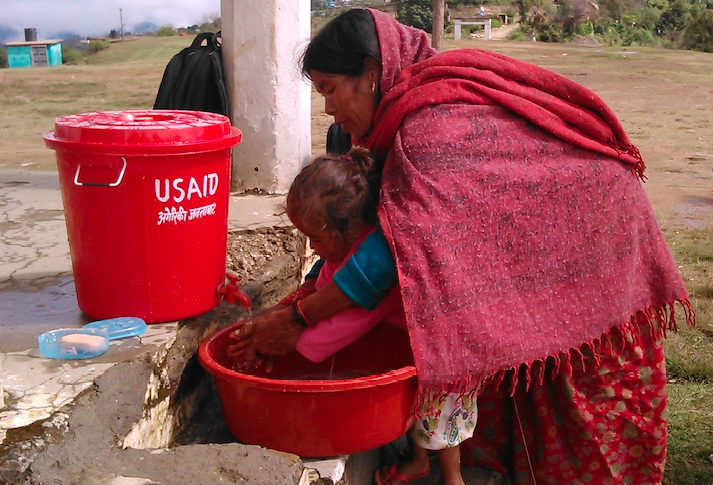
Throughout Nepal, mothers are rising up to improve health, hygiene, and nutrition. The movement’s most visible leader is Deumaya, a straight-talking, forward-thinking Nepali mother-in-law.
Deumaya is the titular character of Bhanchhin Aama, or Mother Knows Best, a radio soap opera broadcast in three languages in 25 of Nepal’s poorest districts. But this soap opera has a twist – each episode focuses on nutrition-related topics such as safely disposing of children’s feces, a balanced diet, and the importance of handwashing and toilet use. The show is a true sensation. Half of all radio owners tune in, and thousands of calls and texts pour in after each episode airs. Four out of five listeners say the show has influenced how they feed and care for their children.
But the movement isn’t just taking place on the airwaves. Mothers of young children also flock to nutrition-learning groups. Tara Baykotai, an 18-year old from a traditionally marginalized socio-economic group, said that her local mothers’ group spurred her to plant a vegetable garden to better feed her family, to teach her 15-month-old daughter Ayushma to wash her hands, and to work with her husband Deepak to build a latrine. “Now our family has changed,” she said. “We started using soap at home and making other changes.”
An Essential Nutrient
Both the soap opera and the mothers’ groups are part of Suaahara, USAID/Nepal’s trailblazing five-year, $54 million nutrition project that launched in 2011. Nepal is one of the most undernourished countries in the world, and 41 percent of children there have stunted growth.
Suaahara is novel because it addresses the wide range of root causes of undernutrition, such as food insecurity, poverty, inadequate healthcare, and poor access to water, sanitation and hygiene (WASH) by training and supporting everyone from farmers to health workers to local and national governments.
Improving WASH has been a particularly important priority, as ensuring healthy, well-nourished children is impossible when WASH conditions are poor. “There are both direct and indirect links between WASH and nutrition,” said Rochelle Rainey, Senior Environmental Health Advisor at USAID’s Global Health Bureau.
Lack of safe water, poor hygiene, and especially lack of sanitation are strongly correlated with acute malnutrition and stunting. Poor WASH leads to diarrhea, gut inflammation, and intestinal worm infections, all of which reduce a person’s absorption of nutrients. Improving WASH not only lessens the incidence of these ailments, but it also reduces the pathogen load of the environment. High pathogen environments are associated with poor health and nutrition.
“Handwashing with soap before touching food and after exposure to feces should be the first step of food preparation or breastfeeding, and an adequate amount of safe drinking water is an essential nutrient just like vitamin A or iron – you can't have good health without it,” said Ms. Rainey.
But improving WASH isn’t easy – it requires entire communities to make fundamental changes. Suaahara inspires these transformations by educating families about small, doable actions that improve health. Suaahara uses posters, comic books, flip charts, and the soap opera; trains villagers in toilet construction; demonstrates the ways that food and water get contaminated by fecal matter; and provides counseling and support in the mothers’ groups.
Bringing Everyone In
Implementing such a wide-ranging, community-centered project necessitates keeping track of different interventions in disparate geographic areas and coordinating with a multitude of stakeholders, which can be challenging. Sometimes, improvements in one area struggle to keep pace with other areas.
Lack of infrastructure impedes some villagers from acting on their newfound WASH knowledge. “Suaahara has been able to increase individuals’ WASH knowledge, but practical application of these skills remains low, often due to water shortages,” said Pragya Shrestha, Environmental Health Specialist at USAID/Nepal.
Suaahara addresses these challenges at regular district-level summits that bring together educators, health workers, journalists, government officials, and other local leaders. These summits use discussions, songs, dramatizations, and a public commitment process to rally a diverse set of local stakeholders for initiatives such as a district sanitation campaign. Suaahara also brings government officials along with project staff to monitor the impact of its activities.
The hope is that educating and engaging decision-makers will enable them to better serve their communities’ needs. “When multi-sectoral government representatives jointly visit activity events, they learn about women’s practical needs, such as the length of trip to fetch water or shortage of land for gardens, and can better address them,” said Ms. Shrestha.
Despite obstacles, Suaahara is already seeing results that will lead to improved health and nutrition. The percentage of women washing their hands at critical times rose from just 35 percent before the project started to 60 percent, and the percentage of households with latrines increased from 78 percent to 84 percent. Sixty-two villages have now been declared “open-defecation free.”
Moreover, Nepal’s mothers are now armed with WASH and nutrition knowledge that they can apply for life. “My biggest challenge was not knowing – if I would have known that leaving my child on the ground in our yard would lead to diarrhea and loss of appetite, I would have been careful,” said new mother Saraswati Acharya. “I have learned many practical small doable things thanks to Suaahara, like washing hands with soap, drinking boiled water at home, and proper disposal of my child’s feces… I make sure to practice the things I’ve learned.”
C. Zeilberger
More Information
USAID Multi-Sectoral Nutrition Strategy 2014-2025
Global Waters November 2014 op-ed by USAID Nutrition Division Chief Anne Peniston







Comment
Make a general inquiry or suggest an improvement.